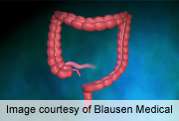(HealthDay)—Hospital risk-adjusted margin positivity rate (RAMP) can identify performance-based outliers and represents a rectal cancer surgery quality metric, according to a study published online Aug. 4 in the Journal of Clinical Oncology.
Nader N. Massarweh, M.D., from the University of Texas M.D. Anderson Cancer Center in Houston, and colleagues conducted an observational cohort study of 32,354 patients with rectal cancer within the National Cancer Data Base (2003 to 2005), treated at 1,349 hospitals. Using standard observed-to-expected methodology, hospital performance was classified as low outlier (better than expected), high outlier (worse than expected), or non-RAMP outlier.
The researchers observed significant correlations for various structural (academic status and volume), process (pathologic nodal evaluation and neoadjuvant radiation therapy use), and outcome (sphincter preservation, readmission, and 30-day postoperative mortality) measures with outlier status. Low outliers had better five-year overall survival than high outliers and nonoutliers (79.9 versus 64.9 and 68.9 percent, respectively; P < 0.01). The risk of death was lower at low outliers versus high outliers and nonoutliers (hazard ratios, 0.61 and 0.69, respectively). A higher risk of death was seen at high outliers versus nonoutliers (hazard ratio, 1.12).
"Hospital RAMP outlier status is a rectal cancer surgery composite metric that reliably captures hospital quality across all levels of care and could be integrated into existing quality improvement initiatives for hospital performance," the authors write.
More information:
Abstract
Full Text (subscription or payment may be required)
Editorial
Journal information: Journal of Clinical Oncology
Copyright © 2014 HealthDay. All rights reserved.






















